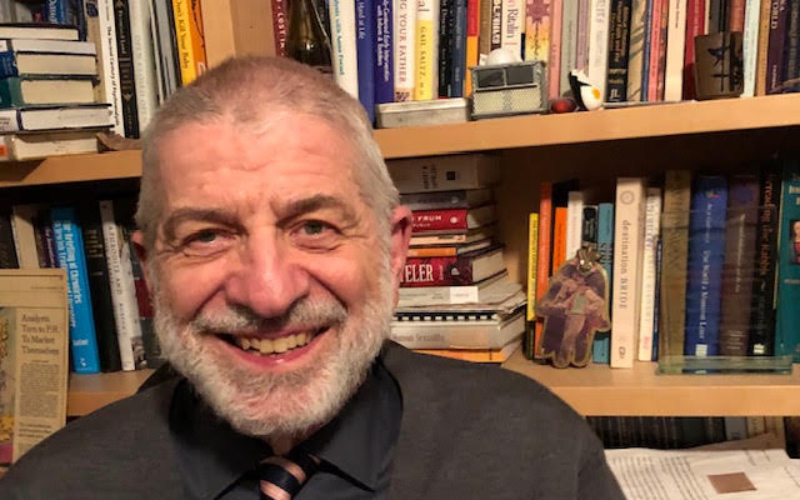“The work with children in pointing out avoidance of painful situations goes back to the work of Berta Bornstein who was one of Anna Freud students. ”

Leon Hoffman MD.
New York City
Episode Description:
Harvey Schwartz welcomes Dr. Leon Hoffman, who is a Training Analyst, and a child, adolescent and adult Psychoanalyst at the New York Psychoanalytic Society and Institute, and he is also the Co-Director of the Pacella Research Center. Dr. Hoffman is the Chief Psychiatrist and Psychoanalyst at the West End Day School in New York City and he is the Co-Developer of the ongoing clinician research seminar at the New York Psychoanalytic Society and institute.
The focus of today’s conversation is on Dr. Hoffman’s role as the Co-Investigator of the Evaluation of Regulation Focused Psychotherapy for Children, which is a key part of his life’s work. As you will hear in this episode, Dr. Hoffman brings his warmth, enthusiasm, and his deep feeling for understanding the inner lives of children, even when they make that very difficult, even when their disruptive behavior leads them to be not listened to by many, Dr. Hoffman is committed not only to listen to them but to train others to learn how to listen to them.
Key Takeaways:
[3:55] Dr. Hoffman shares his own thoughts about the advantages and disadvantages of a manualized approach and the clinical challenges he and his team have faced after creating the manual.
[9:20] Dr. Hoffman talks about his work taking key aspects of child analytic work and bringing them to a broader community, in terms of clinicians and patients.
[9:51] Children with behavioral problems are experts in bringing up the weak spots of the therapist.
[10:40] Dr. Hoffman and his team developed a manual meant to help analysts with her or his countertransference.
[13:31] Dr. Hoffman explains children tell a story in a disguised way through play.
[14:00] Dr. Hoffman shares a case example where defense was addressed from the start.
[19:05] The pros and cons of a short term treatment.
[21:58] Positive transference is not interpreted, only disruptions and countertransference.
[26:04] Dr. Hoffman details how the therapist addresses in the play the patient’s response to her scary feelings.
[27:35] The triangle of defense.
[29:53] Listening and understanding the emotions behind the child’s behaviors lead to great improvements in a short period of time.
[31:43] Stop, look and listen.
[32:15] What brought Dr. Hoffman to child analysis?
Mentioned in This Episode
IPA Off the Couch – www.ipaoffthecouch.org
Recommended Readings
Hoffman, L., Rice, T. R., with Prout, T. A. (2016). Manual of regulation-focused psychotherapy for children (RFP-C) with externalizing behaviors: A psychodynamic approach. New York, NY: Routledge.
Berta Bornstein’s Frankie: The Contemporary Relevance of a Classic to the Treatment of Children with Disruptive Symptoms. The Psychoanalytic Study of the Child 68:152-176
Rice, TR, and Hoffman, L. (2014). Defense Mechanisms and Implicit Emotion Regulation: A Comparison of a Psychodynamic Construct with One from Contemporary Neuroscience. J Am Psychoanal Assoc 62: 693-708.
Prout, T. A., Bernstein, M., Gaines, E., Aizin, S., Sessler, D., Racine, E., Spigelman, A., Rice, T., & Hoffman, L. (2020). Regulation Focused Psychotherapy for Children in clinical practice: Case vignettes from psychotherapy outcome studies. International Journal of Play Therapy, 29(1), 43–53
Prout, T. A., Rice, T., Murphy, S., Gaines, E., Aizin, S., Sessler, D., … & Hoffman, L. (2019). Why Is It Easier to Get Mad Than It Is to Feel Sad? Pilot Study of Regulation-Focused Psychotherapy for Children. American journal of psychotherapy, 72(1), 2-8.

Thank you for this very excellent introduction to the important work of Leon Hoffman, MD, and his colleagues on treatment of children with externalizing behaviors, which makes up one of the largest numbers of referrals of children and adolescents to mental health professionals. In this inspiring podcast, we hear how fundamental techniques of child psychoanalysis can be applied in a form of short-term psychoanalytic psychotherapy, which in many of their cases turns the child’s aggressive acting out behaviors into an increased ability to express their painful emotions into words, a process of parents, teachers and caretakers being able, as Dr. Hoffman tells us to move from the emphasis on “managing the child to understanding the child’s emotions”, and to the successful termination of the original acting out behaviors.
Thank you for your nice words, Dr. Abrams. I think there are two critical points that we try to make: One is that all of us who work with children, as parents, as teachers, as mental health professionals have the very tough job of listening to children and adolescents. Listening, without jumping in, can help the adults begin to unearth what is troubling to the youngsters, that is, what are the unbearable emotions with which they are struggling. Secondly, youngsters who react impulsively are also trying to combat the pain of their emotional state. Listening to them and not simply reacting is aLways a difficult task.
Thank you